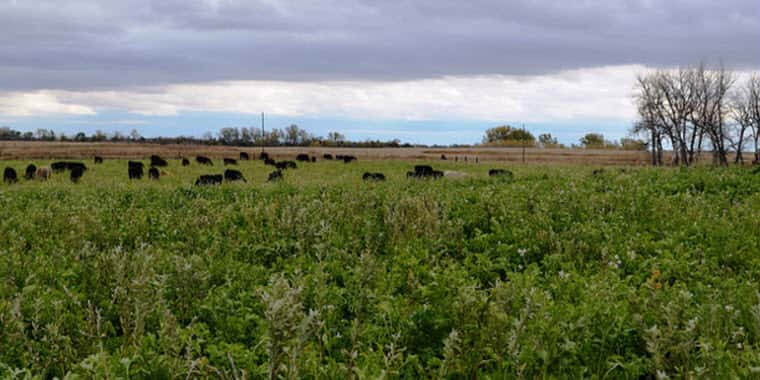DTN – Bayer Crop Science’s carbon program that has more than 1,000 farmers already enrolled will receive a big boost from an agreement with CHS Inc. announced this week.
The agreement will make the program that pays producers for their carbon-smart practices accessible to thousands of additional farmers and ranchers.
CHS is owned by more than 900 local cooperatives and 75,000 farmers and ranchers across the country. The program will be extended to CHS farmer-owners across 17 states already covered by the program, and also in Colorado, Montana, Oklahoma and Texas.
The Bayer program, which was launched in 2020, pays up to $9 an acre to farmers who use cover crops, no- and low-till practices. As part of the agreement, CHS members can earn an additional $3 per acre by purchasing enhanced-efficiency fertilizer products from CHS, including N-Edge, Trivar and Levesol.
Lisa Streck, carbon business model grower program lead at Bayer, said the company has made it easy for producers to get involved.
“We’ve really built our program around three key frameworks, simplicity, flexibility and certainty,” Streck told DTN.
“And that’s been based on market research that we’ve done, experience that we’ve had with our pilot growers, as well as having a carbon-advisory panel to help guide us as we evolve program. So, it’s real easy for farmers to join the program.”
In order to enroll, farmers need a Climate FieldView account to share with Bayer.
“From there they select the fields they want to enroll and then, you know, answer some questions about when they started their climate-smart practices such as no-till, strip-till and cover crop on each of the different fields they choose to enroll,” Streck said.
In September, USDA announced the launch of a climate-smart partnership initiative to finance what U.S. Secretary of Agriculture Tom Vilsack called in a speech the “production of climate-smart commodities” through a series of large-scale pilots and demonstration projects.
Streck said both the public and private sectors have roles to play in building climate-smart practices in agriculture.
“When we think about the role that USDA is playing, we’re following that very closely with our teams in Washington, D.C.,” she said, “and I think it’ll be important for all the players within the industry, whether it be private business or government that we’ve all got a role here to play to see the importance of sustainability within agriculture.”
Bayer’s Carbon Initiative includes sustainability commitments aimed to reduce field greenhouse gas emissions by 30% in 2030.
“CHS is a trusted farm adviser, and we’re looking forward to strengthening our long-term relationship to expand our carbon program to CHS customers,” said Leo Bastos, who leads global commercial ecosystems for Bayer, including its carbon program.
“The Bayer carbon program is a natural extension to grow our relationship since we’re both highly committed to agriculture sustainability and to providing farmers with the latest tools and technologies to promote profitability.”
Terry Herzig, director of retail agronomy at CHS, said in a news release that farmers are positioned to expand their sustainability practices.
“While agriculture is listed by the EPA as a contributor to greenhouse gas emissions, it also is one of the few industries with the ability to do something about it,” he said.
“CHS is proud to work with Bayer to offer incentives for practices and products that can enhance soil health, improve yields and drive sustainable outcomes.”
In July 2020, Bayer announced it was creating a carbon initiative. The company started looking at how to sequester carbon on its seed production farms and whether that might help with corporate reporting on carbon emissions.
Bayer initially partnered with several groups, including the National Corn Growers Association’s Soil Health Partnership, which had received a USDA conservation innovation grant to account for carbon sequestration on farmland.
####
DTN – 2021


